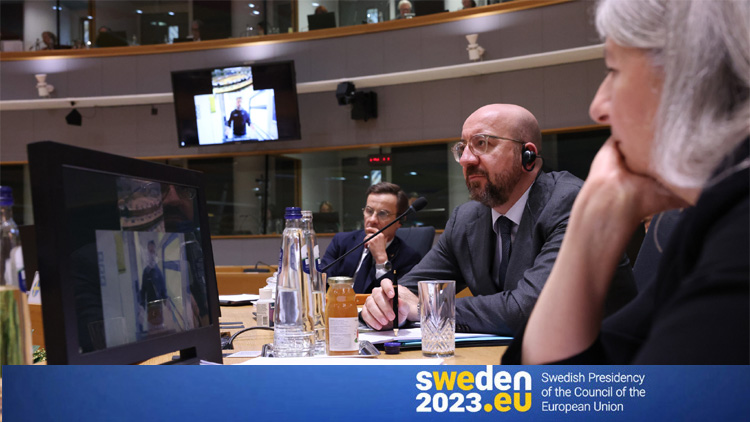Ukraine and European competitiveness top the agenda as EU leaders met in Brussels
Prime Minister Ulf Kristersson met with colleagues in the European Council on 23–24 March, where conclusions on Ukraine, competitiveness, the economy, energy and migration were adopted.
UN Secretary-General António Guterres took part in the meeting of EU heads of state and government and emphasised the global consequences of Russia’s war in Ukraine.
“One of the most crucial issues for Sweden was to bring European competitiveness into focus. We need to get the right conditions in place to be able to compete with the rest of the world,” said Mr Kristersson following the meeting.
He added:
“The decision to send more ammunition to Ukraine is an important one.”
Russia’s war of aggression against Ukraine
The European Council once again resolutely condemned Russia’s war of aggression against Ukraine.
The EU leaders discussed support to Ukraine and its population, focusing on both a response to the huge and immediate humanitarian needs and how the EU can guarantee the sustainability of its military and financial support to Ukraine.
The EU remains committed to maintaining and increasing collective pressure on Russia through possible further sanctions and continued work on the oil price cap.
The EU leaders emphasised that Russia immediately needs to ensure that Ukrainians – primarily Ukrainian children – who have been forcibly displaced or deported to Russia are able to return safely to Ukraine.
President of Ukraine Volodymyr Zelenskyy joined the EU leaders via video conference.
Procurement of ammunition
The European Council welcomed the agreement of 20 March between EU foreign and defence ministers on the joint procurement of ammunition to Ukraine.
The agreement means that one million rounds of artillery ammunition will be delivered to Ukraine within a year.
Global consequences of Russia’s war in Ukraine
Mr Guterres took part in the first day of the European Council meeting.
The European Council took note of the recent extension of the UN Black Sea Grain Initiative and the Grain from Ukraine Initiative, and emphasised the EU’s contribution to support Ukrainian food exports through Solidarity Lanes.
In addition, the European Council welcomed a resolution by the UN General Assembly entitled Principles of the Charter of the United Nations underlying a comprehensive, just and lasting peace in Ukraine, which was adopted in February and received broad support from the international community. EU leaders also reiterated their support for President Zelenskyy’s peace plan.
Competitiveness and economy
The EU’s long-term competitiveness was high on the agenda at the meeting. The EU leaders adopted several conclusions, including on strengthening the EU’s productivity, reducing the administrative burden for businesses by simplifying rules, and reducing the EU’s strategic dependencies.
The leaders also adopted conclusions on encouraging innovation, increasing investment in research and development, strengthening digitalisation and increasing investments in the skills of the future.
In the area of economic policy, the heads of state and government expressed their support for Council orientations for a reform of the EU economic governance framework to make it fitter for current challenges, which was adopted by EU finance ministers on 14 March.
Energy
The EU leaders took stock of actions taken at EU level to address high energy prices, reduce gas demand, ensure security of supply and phase out dependency on Russian fossil fuels.
The European Council also encouraged the Commission and Member States to ensure preparedness and contingency planning in view of the next heating season. In addition, they invited the Commission to promptly finalise the assessment of the emergency measures adopted in 2022 and, where necessary, to propose the extension of their application.
Migration
The Swedish Presidency of the Council of the EU and the Commission informed the European Council about progress in the implementation of its conclusions on migration, which the EU migration ministers adopted in February.
The leaders called for the swift implementation of those conclusions and will review the matter again in June.
Euro Summit
A Euro Summit with President of the European Central Bank Christine Lagarde was held on Friday 24 March. All 27 EU heads of state and government took part in the meeting, which focused on the economic and financial situation.
Other business
The leaders also welcomed the outcome of the latest donor conference in support of people in Türkiye and Syria following the tragic earthquake in February. The Swedish Presidency and the Commission co-hosted the conference, which was held in Brussels on 20 March.
In addition, the EU leaders also welcomed the recent agreement on the Windsor Framework with the United Kingdom.

